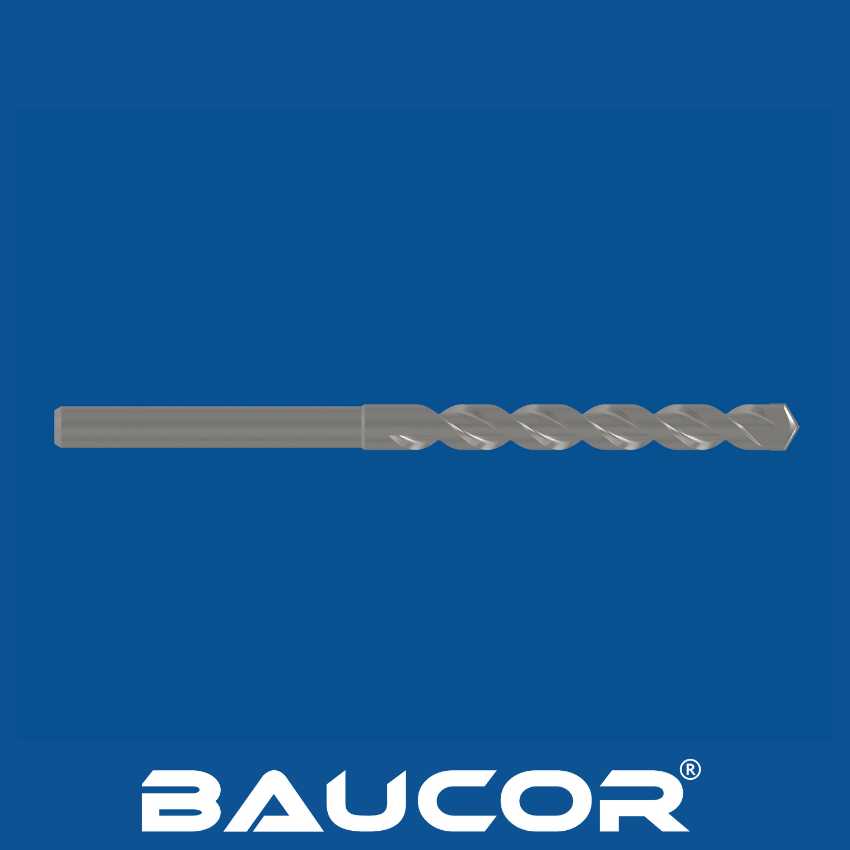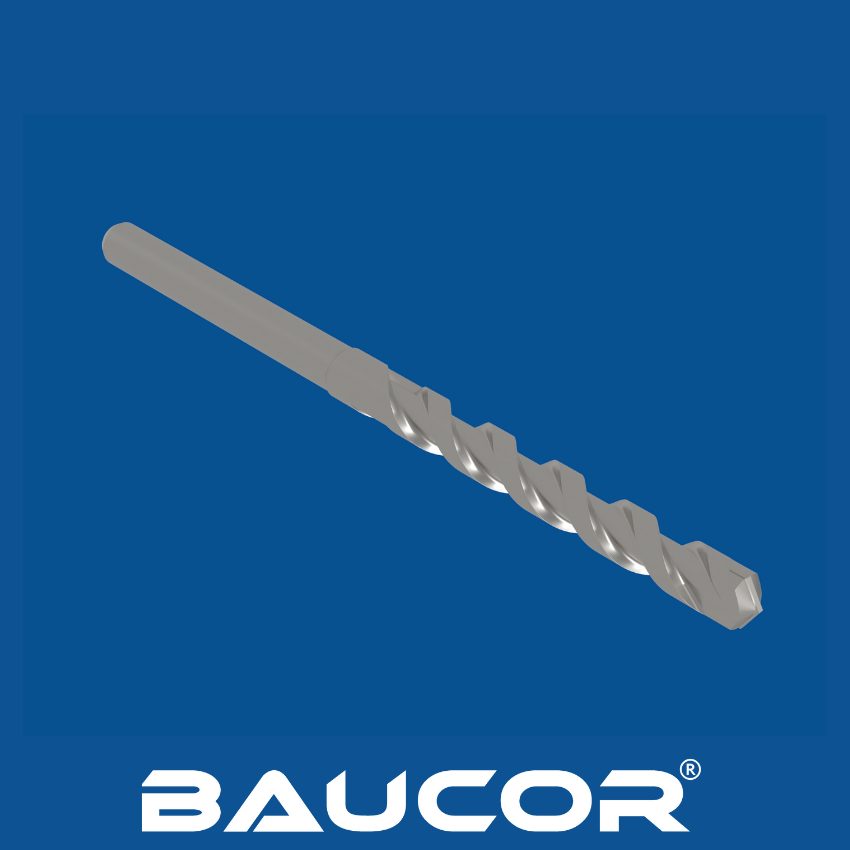BAUCOR: ENGINEERED FOR PRECISION.
EVERY BIT DELIVERS FLAWLESS RESULTS!
BAUCOR: ENGINEERED FOR PRECISION.
EVERY BIT DELIVERS FLAWLESS RESULTS!
Masonry drill bits are specialized drill bits designed to bore holes into hard, brittle materials like brick, concrete, stone, tile, and cinder blocks. They feature a tough carbide tip that can withstand the impact and abrasive forces involved in drilling into these materials.
Key Components
How Masonry Drill Bits Work
Masonry drill bits use a combination of rotary motion and hammering action to break through tough materials:

Raw Materials
Manufacturing Steps

Carbide Tip Brazing:
Heat Treatment: The entire drill bit may undergo heat treatment to increase its hardness and overall toughness.
Grinding and Sharpening: Precision grinding ensures the carbide tip is honed to the correct shape and sharpness for optimal cutting action.
Quality Control: Throughout the process, the bits are inspected to ensure dimensional accuracy and that they meet quality standards.
Manufacturing Considerations
Carbide Quality: The grade of tungsten carbide used significantly impacts the drill bit's lifespan and performance.
Brazing Precision: Proper brazing technique is crucial for a strong bond between the carbide tip and the bit's body.

A straight flute drill is a type of drill bit characterized by its straight cutting edges (flutes) that run parallel to the drill's axis. This design is particularly well-suited for drilling materials that produce short chips.

Stub length drill bits are shorter versions of standard jobber length drills. This design prioritizes rigidity and precision.

Extra long length drill bits, sometimes called "aircraft extension drills" or "long series drills," are specialized tools designed for drilling deeper holes than standard drills can reach.

Masonry Drill Bits for Any Project: Baucor Has the Size You Need
When it comes to masonry drill bits, Baucor covers the full spectrum of sizes to tackle any project, big or small.
Common Size Ranges
Specialty Sizes
Baucor can manufacture drill bits for you ranging from very small sizes like 0.05 mm to large sizes up to 180 mm, accommodating a wide spectrum of drilling requirements.
Please contact us for the appropriate dimensions. Baucor can produce drill bits in the most specialized sizes tailored to your needs.

Center drills are specialized tools designed primarily for creating precise center holes (or starting holes) in workpieces. These center holes serve as accurate guides for subsequent drilling, tapping, or machining operations.

A counterbore drill bit is a specialized tool designed to create a flat-bottomed, cylindrical enlargement at the top of a pre-drilled hole.

A countersink drill bit is a specialized tool designed to create a conical recess at the top of a pre-drilled hole. This recess allows screw heads or other fasteners to sit flush with or below the surface of the workpiece, providing a clean, professional finish.

Double margin drills, as the name suggests, incorporate an additional margin ground behind the leading margin.
Masonry Drill Bit Materials: Choosing the Right Tool for the Job
Core Materials
Tip Material
Rare/Theoretical Materials
Do Coatings Improve Masonry Drill Bits? - Baucor Insights
Possible Coatings
Primary Performance Factor: Carbide Quality
The hardness and quality of the tungsten carbide tip are far more critical to a masonry drill bit's performance than any coating on its body. Focus on choosing bits with durable carbide for the best results.
Why Coatings Are Less Common
Cost vs. Benefit: Advanced coatings add to the price of the drill bit, with limited improvement in lifespan or cutting performance in masonry.
Masonry Drill Bits: Applications Across Industries and DIY Projects - Baucor
Primary Areas of Use:
Construction and Renovation: Drilling into brick, concrete, blocks, and stone for:
Home Improvement and DIY:
Landscaping and Hardscaping:
Drilling into pavers, retaining wall blocks, and natural stone for edging and decorative elements.
Other Uses:
Why Masonry Drill Bits are Ideal
Primary Areas of Use:
Construction and Renovation: Drilling into brick, concrete, blocks, and stone for:
Home Improvement and DIY:
Landscaping and Hardscaping:
Drilling into pavers, retaining wall blocks, and natural stone for edging and decorative elements.
Other Uses:
Why Masonry Drill Bits are Ideal
Primary Machines
Important Considerations
Safety First

Reduced shank drills, also known as blacksmith's drills or silver and deming drills, are specialized tools designed to provide flexibility when working with different drill chucks or machine spindles.

Screw machine length drill bits, also known as stub-length drill bits, are shorter versions of standard jobber length drills.

A spade bit is a flat, paddle-shaped drill bit designed for boring large holes in wood. It features a sharp center point for precise positioning and two broad cutting edges for rapid material removal.

Spot drills are specialized cutting tools designed to create a precise conical indentation ("center") in a workpiece. This serves as a highly accurate starting point for subsequent drilling operations, ensuring the drill bit doesn't wander and ensuring proper alignment.
At Baucor, we're more than just a supplier of masonry drill bits. We're your trusted partner in achieving efficient and precise drilling results, even in the toughest materials. Here's how our design and engineering support can benefit you when choosing and using our masonry drill bits:
Selection and Application Guidance
Material Matching: We'll help you select the ideal masonry bit type and tip material, whether it's tungsten carbide, diamond-tipped, or SDS-Plus, to match the specific masonry materials you'll be drilling into, such as concrete, brick, or stone.
Size and Design Optimization: Our experts will guide you in choosing the optimal drill bit diameter and length for your project, ensuring clean and accurate holes.
Machine Compatibility: We'll ensure you select masonry bits that are compatible with your hammer drill or rotary hammer, considering factors like shank type (SDS-Plus, SDS-Max) and power requirements.
Technical Support
Best Practices: We offer comprehensive guidance on proper masonry drill bit usage, including recommended drilling speeds, techniques for different materials, and essential safety precautions.
Troubleshooting: If you encounter any challenges during drilling, such as slow progress or bit wear, our experienced team is here to provide advice on potential solutions or suggest alternative bit options.
Partnerships and Feedback
Customer Insights: Your feedback is invaluable to us. We actively share customer insights on masonry bit performance with our suppliers, fostering a continuous cycle of improvement and innovation.
Collaboration: If you're a designer or engineer developing a product that involves holes drilled in masonry, we can collaborate on specifications to ensure smooth and efficient manufacturing processes.
At Baucor, we're committed to your success. Let our expertise and support help you achieve optimal results with our masonry drill bits, no matter how demanding your project.

BAUCOR offers custom manufacturing and engineering solutions tailored to your specific needs, across various industries.

BAUCOR's engineers can review your design and provide feedback to improve manufacturability, cost effectiveness, and efficiency.


Key Design Elements
Carbide Tip
Flutes
Shank
Type: Round, hex, and SDS-type shanks exist, each designed for specific drill chucks.
Diameter: Must match the drill chuck's capacity.
Design Trade-offs
Considerations for Engineers and DIYers